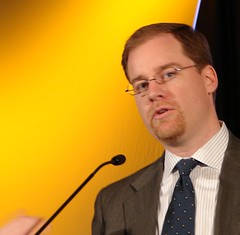 This morning, hundreds of us packed the ballroom of the new Hyatt Regency Colorado Convention Center for the opening of TechKnowledge 06. Incoming ASTD president Kevin Oakes thanked the Rocky Mountain Chapter, advisory boards, hard-working staff, platinum sponsors, silver sponsors, planning committees, and others. Kevin and I go back quite a ways; Oakes Interactive was hawking multimedia training before the Web was invented. If I'm not mistaken, Kevin is the first educational technolgy specialist to lead ASTD.
This morning, hundreds of us packed the ballroom of the new Hyatt Regency Colorado Convention Center for the opening of TechKnowledge 06. Incoming ASTD president Kevin Oakes thanked the Rocky Mountain Chapter, advisory boards, hard-working staff, platinum sponsors, silver sponsors, planning committees, and others. Kevin and I go back quite a ways; Oakes Interactive was hawking multimedia training before the Web was invented. If I'm not mistaken, Kevin is the first educational technolgy specialist to lead ASTD. Elliott Masie took the stage to encourage us to adopt Extreme Learning. We should devote half our time to making incremental improvements in what we've already got, for instance fine-tuning and revamping existing programs. The other 50% should go into things that are dramatically different.
Elliott Masie took the stage to encourage us to adopt Extreme Learning. We should devote half our time to making incremental improvements in what we've already got, for instance fine-tuning and revamping existing programs. The other 50% should go into things that are dramatically different.
He demonstrated a cool little device that projects a working keyboard on virtually any surface. (Elliott advises you not to use this as a sample of dramatically different thinking unless you want to lose your job.)
What if we started every day with a five-minute learning clip?
Business Week's one-question customer service evaluation: would you recommend this to a friend? Not a bad measure for the training business. Who's going to be first to base a training manager's pay on this?
Elliott described a cardiologists' conference where four large videoscreens are showing surgery live. An expert panel gives advice. The entire audience clicks in answers to questions. The Wisdom of Crowds meets medicine.
Elliott offers a new recruit three hours of face time. She says she'll take a pass, asks if he doesn't have a CD version. "Why would you want a CD instead of a live CEO?" The fearless recruit says, "You don't have a fast-forward button."
Excerpted from Internet Time Blog. Would you like to see more excerpts from other blogs posted to Learning Circuits Blog? Leave a comment.




2 comments:
"Business Week's one-question customer service evaluation: would you recommend this to a friend? Not a bad measure for the training business. Who's going to be first to base a training manager's pay on this?"
For years I have been advocating to organizations that they should replace all of their Level One questionnaires with the simple question:"Would you recommend this experience to a friend or colleague? Why or why not?".
You cannot believe the tortured logic that training professionals (even those advising from Big Three consulting firms) engage in to defend the useless 10-20 question surveys that get handed out at the end of a session. If you know it's a good experience, why are you wasting time asking about it? And if you don't know it's good, why are you running it in the first place??
Once you get beyond Level One, there is tremendous resistance among training practitioners to engaging in any activity which might actually measure the extent of their true success. As a result, there is little in the organizational learning world that is as primitive as the way most people approach evaluation.
Whenever I get the chance to "look under the hood" I am usually horrified at the time and money that is wasted on evaluation, the failure to exploit what data is available, and the almost complete absence of a macro-focus, a business impact focus, or even an evaluation strategy.
It's "evaluation 1.0" that gives evaluation a bad name!
Well said Godfrey. It's a sad commentary on the state of affairs in training industry that it has not come up with simple enough mechanism to evaluate the impact on Business.
Everytime I have asked for material on Evaluating Training, I have been directed to Kirpatrick model which if I am not wrong is a classic but probably belongs to another era.
Appreciatively
Sunil Arora
Post a Comment